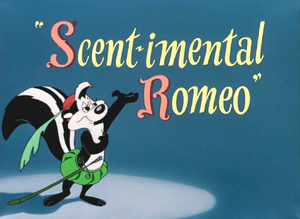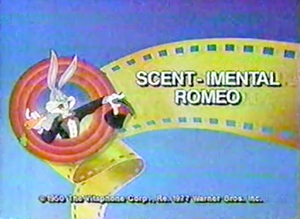Scent-imental Romeo
| Scent-imental Romeo | |
|---|---|
| Production company | Warner Bros. Cartoons |
| Distributor | Warner Bros. Pictures The Vitaphone Corporation |
| Release date | March 24, 1951 |
| Starring | Mel Blanc |
| Producer(s) | Edward Selzer |
| Music composition | Carl Stalling |
| Story | Michael Maltese |
| Animation | Ben Washam Lloyd Vaughan Ken Harris Phil Monroe |
| Director(s) | Charles M. Jones |
| Series navigation | |
| ← Previous | Next → |
| Title card | |

| |
| Second title card | |

| |
Scent-imental Romeo is the three hundred and thirty-third Merrie Melodies theatrical short. It was distributed by Warner Bros. Pictures and The Vitaphone Corporation on March 24, 1951. It was written by Michael Maltese, produced by Edward Selzer and directed by Chuck Jones.
At a zoo in Paris, a female cat, hoping to get some of the meat, disguises herself a skunk to fool a zookeeper into giving her some meat. Upon entering the exhibit, however, she comes in contact with the flirtatious Pepé Le Pew.
Detailed summary
| This article or section is a stub. You can help the Looney Tunes Wiki by expanding it. |
Memorable quotes
Pepé: What is the meaning of this, Monsieur? You shall leave here this instant!
Characters
In order of appearance: | ||||||||||
| ||||||||||
Locations
Objects
- Mallet
- Club
Production
Filming
The short was copyrighted in 1949 (MCMXLIX).
Music
The score was composed by Carl W. Stalling. The main title and closing themes are a rendition of "Merrily We Roll Along," which was arranged by Stalling.
The short also uses the following music cues:
- "April in Paris," by Vernon Duke and E. Y. Harburg, plays during the beginning of the cartoon to establish the setting.
- "The Latin Quarter," by Harry Warren and Al Dubin, is a recurring cue in the cartoon, particularly at the beginning when Penelope begs the zookeeper for meat.
- "Cherie, I Love You," by Lillian Goodman, is a recurring cue, particularly when Pepé first tries to flit with Penelope, and when he arrives at an old mill ride.
- "The Fountain in the Park," by Ed Haley, is sung by Pepé with different lyrics.
- "La Marseillaise," the French national anthem, plays when a confused man applies for the Foreign Legion after being kissed by Pepé.
- "Baby Face," by Benny Davis and Harry Akst, is sung by Pepé when he confronts Penelope on top of a wall.
- Valse des Rayons, the song used in the Jacques Offenbach opera Le Papillon, is heard when Pepé forcefully dances with Penelope.
Release
Dates are in order of release:
- United States: March 24, 1951
Behind the scenes
- The title is another "sentimental" pun, making the third title to use itafter Scent-imental Over You and For Scent-imental Reasons. This time, it is a pun on "Sentimental Romeo."
- The MPAA certificate number is 14154.
- This cartoon marks Pepé's first appearance in the Merrie Melodies series, after having remained exclusive to the Looney Tunes series throughout the 1940s.
- This is also Pepé's first cartoon made during the 1950s. Although, he would not be officially named until the 1952 Merrie Melodies short, Little Beau Pepé.
- The short was censored differently on television airings:
- When it aired on ABC, the scene where Penelope clubs Pepé several times was considerably shortened.[1]
- When it aired on Cartoon Network, a scene of Pepé opening a bottle of champagne was cut,[1]. Despite this, the cartoon aired uncut on international channels, while a short clip of it appears in the Cartoon Network Groovies music video "L'Amour A Une Odeur."[2]
Critical reception
Home availability
- In the United States:
- December 27, 2011: Warner Home Video releases Looney Tunes Super Stars' Pepé Le Pew: Zee Best of Zee Best on DVD.
References
- ↑ 1.0 1.1 "The CENSORED Looney Tunes and Merrie Melodies Guide: S". Initiabase.
- ↑ "Cartoon Network | Groovies: Pepe le Pew: L'amour A Une Odeur | 2010" (YouTube video). Cartoon Network Brasil.